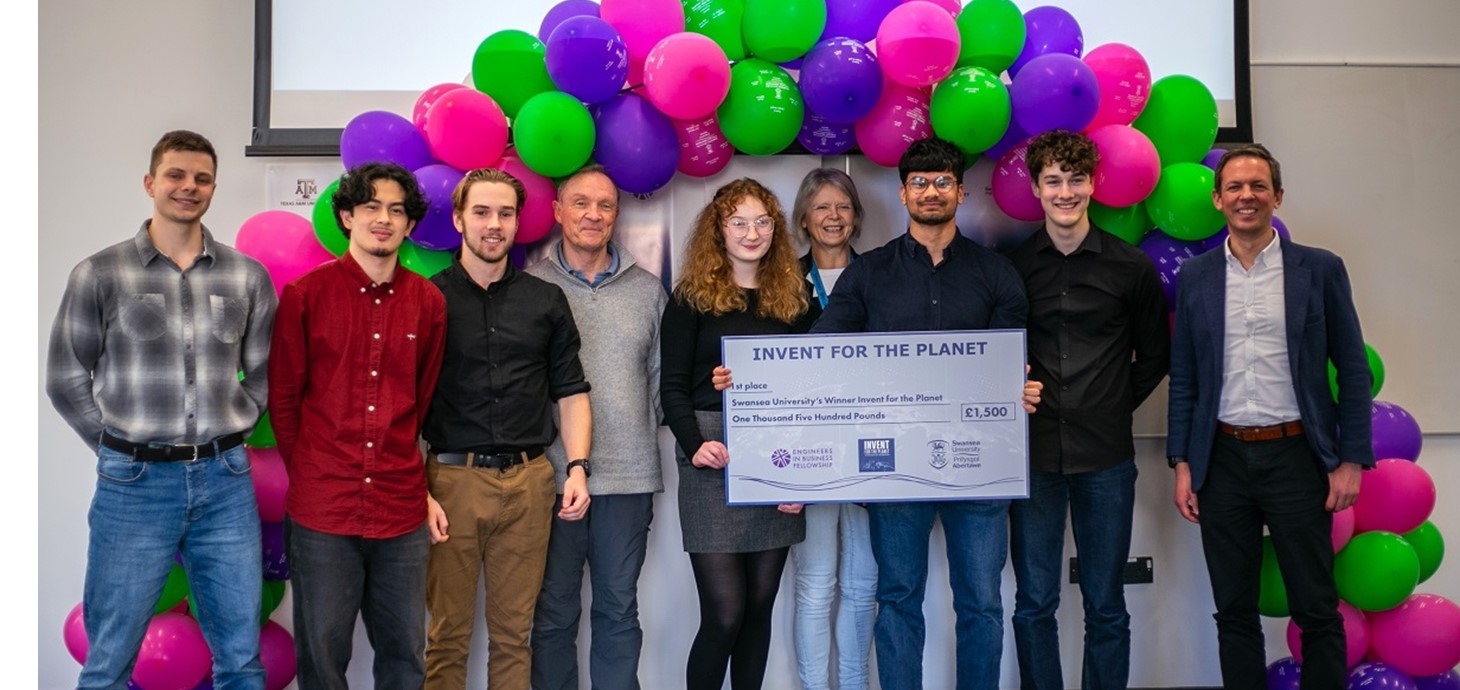
Winning team Pure Flow with competition judges, at the Swansea University event. They went on to reach the European semi-final of Invent for the Planet
A team of Swansea University students who have designed a filtration system to make river water safe to drink reached the European semi-final of a worldwide design competition.
The competition is called “Invent for the Planet”. Run by Texas A&M University, it was open to 20 participating universities in 15 countries around the world. Swansea was the only UK university invited to participate.
Students work in local teams and select a global challenge. This year they included improving access to clean water in Papua New Guinea, creating innovative housing for growing populations, reducing bycatch to safeguard marine life and creating sustainable energy solutions for countries in sub-Saharan Africa.
Each team then has 48 hours to research their challenge, create a prototype and develop an elevator pitch which they present to a panel of judges.
Forty Swansea students took part, drawn from 11 countries around the world and from 12 subjects across the faculty of Science and Engineering.
The winning team - called Pure Flow – was made up of six students: Francesca Jarvis, studying maths and computer science; Sean Calucag, studying chemical engineering; and Hywel Crawley, Harry Griffiths, Sanskar Aryal and Oskar Augustin, all studying mechanical engineering.
Their challenge was to invent a solution to help Papua New Guinea to improve access to clean water and sanitation, which is difficult because of the geography of the country.
Their solution was a low-cost, low maintenance filtration system which filters river water to provide clean drinking water to rural populations.
Pure Flow recently competed in the European semi-final which took place at Atlantic Technological University in Galway, Ireland. They came out as runners-up, narrowly missing out on first place to Universidad Politécnica de Madrid (UPM, Technical University of Madrid) from Spain, who now go through to the worldwide final.
During the competition the team produced an early prototype of the filtration system, which the judges thought had the potential to be a viable product. The University’s enterprise team, which has a strong track record in supporting student start-ups, will also be able to offer advice on developing the idea further.
Sanskar Aryal, a member of the winning team and a second-year Mechanical Engineering student, said:
“Invent for the Planet was awesome! I loved every challenge and activity and will be taking away a driven mindset, the feeling of overcoming a challenge and some really good memories.”
Oluwadra Bobade, a second year Electrical and Electronics Engineering student, said:
“It was a fantastic experience - this is what engineering is about! I'd do it again in a heartbeat.”
Ashima Anand, MSc Structural Engineering student, said:
“It was an amazing experience to work with new people from other subjects and years, and we had so much support from the staff. I would do it again 100%.”
Swansea’s success in Invent for the Planet is another product of the flourishing partnership that Swansea University has built with leading universities in Texas, like A&M. The partnership also includes student exchange schemes and research collaborations in areas such as nanomedicine.
Dr Caroline Coleman-Davies, Texas Strategic Partnership lead and co-organiser for Invent for the Planet, said:
“Invent for the Planet gives our students a fantastic opportunity to work with students from other subjects, disciplines and year groups, as well as interact with participants and mentors from around the world. Since it started in 2018, this Invent for the Planet continues to go from strength to strength and we are extremely grateful to our long-time partner, Texas A&M University for giving Swansea students the opportunity to be part of this unique event.”
Kelly Jordan, Senior Entrepreneurship Officer and co-organiser for Invent for the Planet, said:
“Invent for the Planet allows students to develop their entrepreneurial skills, put into practice the engineering and scientific knowledge they’ve learned during their studies at Swansea and prepare them to make a positive impact in the world. This is just one of the events that the enterprise team runs to help students develop their entrepreneurship skills and their final presentations demonstrate how much they can learn in just 48 hours.”
Professor Helen Griffiths, Pro Vice Chancellor for research, and one of the judges for the competition, said:
“We are delighted to be the only UK university invited to participate in Invent for the Planet. We pride ourselves on attracting the brightest and the best students to study with us, and Invent for the Planet showed their entrepreneurial creativity and just what they are capable of. The concepts, prototypes and pitches that they developed in just 48 hours were extremely impressive and I'd like to congratulate all of the teams on their achievements."
This year’s event was sponsored by the Engineers in Business Fellowship. It was delivered by a cross-University team involving experts from Research, Engagement and Innovation Services, Academic Partnerships and from Engineering, Chemistry, Physics and Geography.
